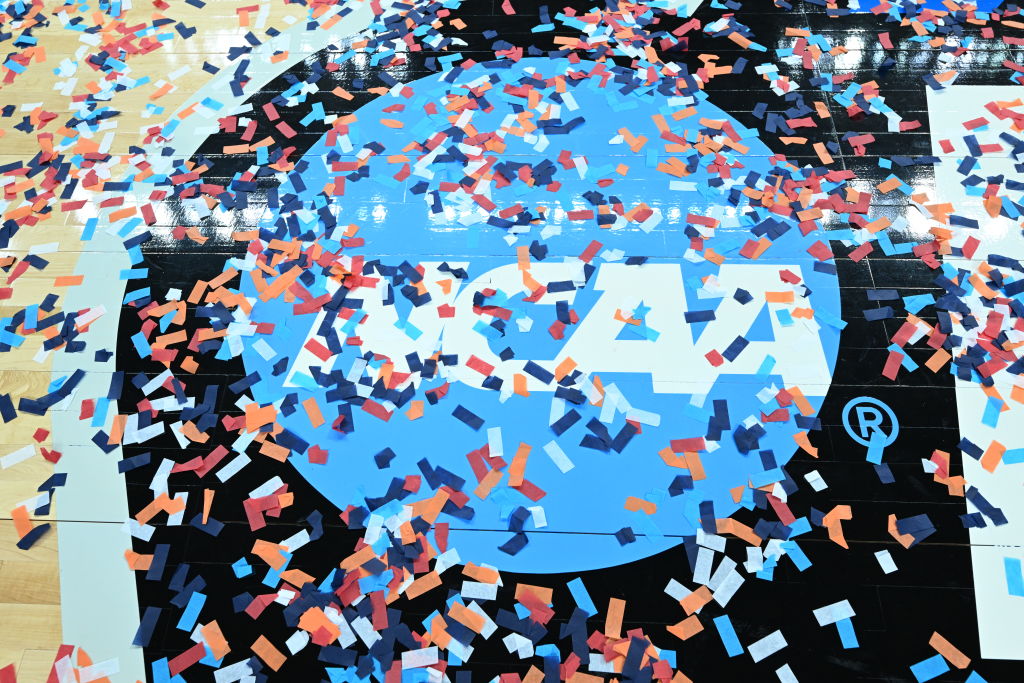News broke Thursday night that the NCAA and Power 5 conferences have agreed to settle three antitrust cases that were brought against them in federal court. If approved by the judge presiding over the three cases, the landmark settlement will allow schools to start directly paying players, bringing an end to the NCAA's amateurism racket.
The settlement terms would see the NCAA paying $2.7 billion in damages to current and former athletes. All Division I athletes dating back to 2016 are eligible to claim a portion of the $2.7 billion award, which must be paid out within a 10-year window. The settlement would also give Power 5 schools the ability to start paying current and future players through a basic revenue-sharing program; each school would have the ability to pay roughly $20 million per year to its athletes.
Although athletes gaining some access to damages and revenue-sharing is a monumental step, this settlement would not turn college sports into a fair and equitable enterprise overnight. That can only be achieved through contract negotiations, and that can only be possible with collective bargaining, which would require players being recognized as employees. The NCAA and its member schools remain staunchly opposed to granting players that designation and the ability to bargain that comes with it, which goes some way toward explaining why they agreed to this settlement.
To be clear, the NCAA settled these cases because it was going to lose badly. Administrators waving their hands around and saying "student-athletes," "value of a degree," and "tradition" may have effectively hypnotized fans and the media for the better part of 100 years, but that's not the kind of argument that holds up in federal court. So the NCAA also settled these cases in the hope of halting the progress this settlement represents before it can go any further.
The revenue-sharing program installed by this settlement would not give the NCAA any protection against future antitrust cases, any of which would be able to convincingly argue that Power 5 schools arbitrarily throwing $20 million at their athletes every year does not suddenly put those schools and the NCAA on the right side of the law. The NCAA's hope is that the revenue-sharing program will buy enough time and goodwill to achieve its actual goal, which is to get an antitrust exemption from Congress and forever deny athletes their right to be recognized as employees. NCAA president Charlie Baker said as much in his statement about the settlement:
This settlement is also a road map for college sports leaders and Congress to ensure this uniquely American institution can continue to provide unmatched opportunity for millions of students.
Charlie Baker via ESPN
Notre Dame president John Jenkins was a little more explicit:
To save the great American institution of college sports, Congress must pass legislation that will preempt the current patchwork of state laws; establish that our athletes are not employees, but students seeking college degrees; and provide protection from further antitrust lawsuits that will allow colleges to make and enforce rules that will protect our student-athletes and help ensure competitive equity among our teams.
John Jenkins via ESPN
The NCAA's survival now depends on Congress taking pity on the organization, and on this revenue-sharing agreement slowing down the deluge of lawsuits that up to this point have been the only reliable mechanism for chipping away at this lucrative scam. It's pathetic in a way, watching this rotten institution acknowledge its lack of purpose while simultaneously begging for its life, all just so that it can go shambling into the future as a zombified version of itself. But now is not the time for pity. Much has been won by the athletes who finally decided to take the NCAA to court, and there are still more ill-gotten spoils to be wrested back. It's time for collective bargaining to put the NCAA out of its misery once and for all.






